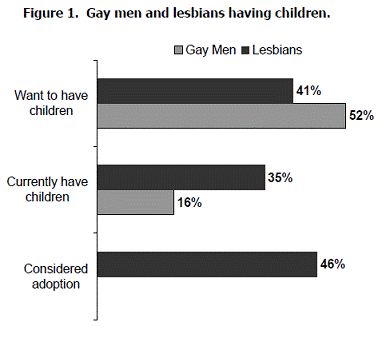As long as same-sex couples can't get married, research can't tell us much about what same-sex marriage will be like -- especially how legal recognition might affect their social legitimacy in the eyes of others, as well as their commitments and investments as partners and parents. The main U.S. data collection agencies are working on collecting data for those legal marriages that are occurring in the U.S. -- with a new license to truth from the Obama administration -- but that will take time. We do have some leads, meanwhile, either from studying same-sex partnerships that don't involve legal marriage, or from studying those legal same-sex marriages where they are occurring elsewhere.
The numbers are growing, as more gay couples marry or otherwise commit and more pursue parenting. Lots of these couples parent through adoption or fostering, as Gary Gates and colleagues have reported:

In the NYT magazine, Lisa Belkin summarizes research on same-sex couples parenting from two new books, Lesbian and Gay Parents and Their Children, by Abbie Goldberg; and When Gay People Get Married, by M. V. Lee Badgett.
Belkin summarizes:
In most ways, the accumulated research shows, children of same-sex parents are not markedly different from those of heterosexual parents. They show no increased incidence of psychiatric disorders, are just as popular at school and have just as many friends. While girls raised by lesbian mothers seem slightly more likely to have more sexual partners, and boys slightly more likely to have fewer, than those raised by heterosexual mothers, neither sex is more likely to suffer from gender confusion nor to identify themselves as gay.
More enlightening than the similarities, however, are the differences, the most striking of which is that these children tend to be less conventional and more flexible when it comes to gender roles and assumptions than those raised in more traditional families.
This is consistent with an earlier meta-analysis I have been using in class for years, "(How) Does the Sexual Orientation of Parents Matter?," by Judith Stacey and Timothy Biblarz from American Sociological Review. We still have more data on lesbian parents than gay parents -- and many are re-partnered parent-stepparent couples, which have their own dynamics -- but this is good progress on the research side at least.
Cross-posted from the Family Inequality blog.